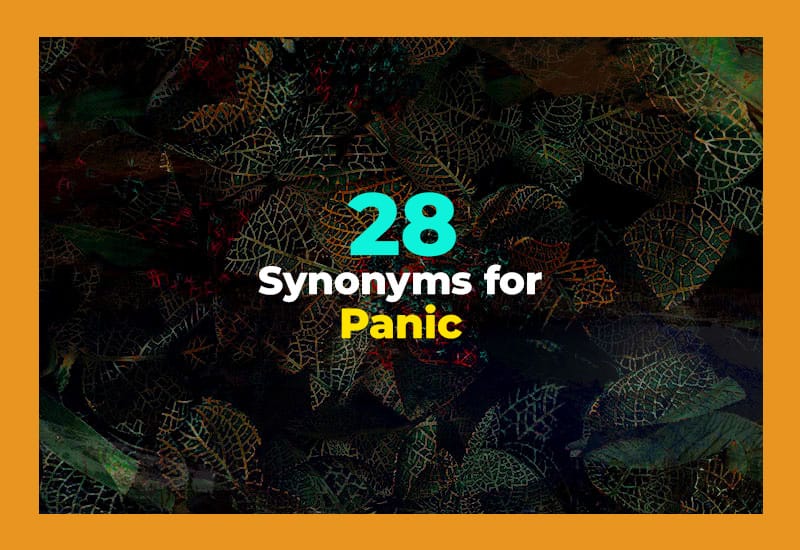You know how sometimes panic can take over and make you feel scared or worried? Panic is a strong feeling of fear or stress that can make things feel out of control. There are many other words like panic that help explain this feeling in different ways. In this article, you will learn 28 of the best synonyms for panic with easy examples to understand how to use them well.
1. Fear
Fear is a basic feeling we get when we think something bad might happen. It's like an alarm in your mind telling you to be careful. Fear helps keep us safe but can also make us feel nervous or frozen. For example, "She felt fear when she saw the big dog." Fear can be small or big, but it always means feeling worried about danger or trouble. People feel fear before exams, in the dark, or when trying something new.
2. Alarm
Alarm is a sudden feeling of worry or fear that something bad is happening. It's like a warning bell inside you. When you hear an alarm, you get ready to act fast. For example, "The loud noise caused alarm in the crowd." Alarm is often quick and makes people pay attention to danger. It helps us get ready to protect ourselves or others. You can feel alarm when there is a fire or an emergency.
3. Fright
Fright is a quick and strong fear caused by something surprising or scary. It makes your heart beat fast and your body tense. For example, "The sudden thunder gave her a fright." Fright usually happens in a short moment but can be very strong. It is like a shock that makes you jump or scream. People feel fright when they see something unexpected or dangerous.
4. Terror
Terror is a very strong and deep fear that can feel overwhelming. It is much more than just being scared; it can make you feel frozen or unable to think clearly. For example, "He was filled with terror during the earthquake." Terror is often linked to very dangerous or scary events. It is a strong word to describe fear that can stay with you for a long time.
5. Dread
Dread is a slow and heavy feeling of fear about something that might happen in the future. It is a nervous waiting for bad news or a bad event. For example, "She felt dread before her job interview." Dread is different from quick fear because it grows inside you over time. People feel dread when they worry about illness, tests, or problems at work.
6. Anxiety
Anxiety is a feeling of worry and fear that stays with you and can make it hard to relax. It often comes without a clear reason but still feels very real. For example, "He felt anxiety before speaking in front of the class." Anxiety can affect your body, making your heart race or your stomach hurt. It is a common feeling many people face every day.
7. Worry
Worry is thinking a lot about problems or dangers that might happen. It makes you feel nervous and upset inside. For example, "She was full of worry about her sick friend." Worry can help you prepare for something, but too much worry can make you feel tired or sad. It is a feeling that often comes when you care about something important.
8. Stress
Stress is the feeling you get when you have too much to do or problems you can't easily fix. It makes your mind and body work too hard. For example, "He felt stress before the big exam." Stress can cause headaches, trouble sleeping, or feeling angry. It happens when life feels hard or out of control, but you can learn ways to manage stress.
9. Hysteria
Hysteria means a strong, out-of-control feeling of panic or fear. It often leads to loud crying, screaming, or fast actions. For example, "The crowd fell into hysteria after hearing the news." Hysteria can spread quickly among people and make it hard to think clearly. It shows how panic can become very strong and hard to stop.
10. Confusion
Confusion is feeling mixed up or not sure what to do or think. It happens when panic makes your mind unclear. For example, "There was confusion during the emergency." Confusion can make it hard to make decisions or understand what is happening. It often comes with panic because everything feels sudden or unexpected.
11. Shock
Shock is a strong and sudden feeling when something bad or surprising happens. It can make your body feel weak or numb. For example, "She was in shock after the accident." Shock is like your mind and body freezing because the news is too hard to believe. It can take time to recover from shock and start feeling normal again.
12. Scare
A scare is a quick moment of fear that can surprise you. It is smaller than panic but still strong enough to make you jump. For example, "He got a scare when the cat jumped on him." Scares happen all the time, like when a loud noise or a sudden movement surprises you. They usually go away fast but remind you of fear.
13. Unease
Unease is a soft feeling of worry or discomfort inside. It is not full panic but tells you something is not right. For example, "She felt unease walking alone at night." Unease can make you feel restless or unsure about a situation. It is like a warning feeling that helps you stay careful without full fear.
14. Distress
Distress means feeling very upset or worried because of pain, loss, or trouble. It is a strong feeling that affects your heart and mind. For example, "He was in distress after hearing bad news." Distress can make people cry, feel helpless, or ask for help. It shows how panic can also bring sadness and pain.
15. Frenzy
Frenzy is a state of wild and uncontrolled panic or excitement. It makes people act fast and sometimes without thinking. For example, "The shoppers were in a frenzy during the sale." Frenzy can cause chaos and confusion because people rush to do things quickly. It shows how panic can change behavior and make things noisy or busy.
16. Madness
Madness means feeling crazy or out of control because of strong emotions like panic. It is not about being mentally ill but about extreme feelings. For example, "The madness of the crowd was clear during the event." Madness shows how panic can make people lose control of their actions or thoughts.
17. Agitation
Agitation is a restless or nervous feeling caused by worry or panic. It makes it hard to stay calm or still. For example, "He showed agitation while waiting for the test results." Agitation can make people fidget, talk fast, or feel tense. It often happens when the mind is full of fear or stress.
18. Nervousness
Nervousness is feeling shy, worried, or afraid about what might happen. It is a mild form of panic that many people feel before new or hard things. For example, "She felt nervousness before the interview." Nervousness can cause sweating, shaking, or a fast heartbeat. It helps prepare you but can also make you uncomfortable.
19. Tension
Tension is a feeling of tightness or stress in your body or mind caused by fear or worry. For example, "There was tension in the room before the announcement." Tension can make muscles hurt or cause headaches. It shows how panic can affect not only your mind but also your body.
20. Chaos
Chaos means a state of total confusion and disorder, often caused by panic. It happens when things get out of control. For example, "The storm caused chaos in the city." Chaos can make it hard to think or act clearly. It is the result of panic spreading in groups or situations.
21. Disquiet
Disquiet is a quiet feeling of worry or fear that stays with you. It is not loud like panic but still makes you uneasy. For example, "There was disquiet in the community after the news." Disquiet can cause restless thoughts and make it hard to relax. It shows the slow and calm side of panic feelings.
22. Dismay
Dismay is feeling sad and worried because something bad has happened. It is a mix of fear and disappointment. For example, "She felt dismay when her plans changed." Dismay can make people stop and think about what went wrong. It is a softer form of panic that brings sadness.
23. Horror
Horror is a strong feeling of shock and fear about something very bad or scary. It is more than just being afraid. For example, "He felt horror watching the scary movie." Horror can make people want to run away or hide. It is often linked to things that are frightening or cruel.
24. Jitters
Jitters are small feelings of nervousness or fear that make you shaky or restless. For example, "She had the jitters before her speech." Jitters are like butterflies in your stomach and happen before important moments. They are a mild form of panic but can be uncomfortable.
25. Jumpy
Jumpy means being easily scared or nervous. It shows you are ready to react quickly because you feel panic inside. For example, "He was jumpy after hearing strange noises." Being jumpy can make it hard to relax or sleep. It shows how panic affects your body's reactions.
26. Overwhelm
Overwhelm is a strong feeling when panic or stress is too much to handle. It makes you feel lost or unable to think clearly. For example, "She was overwhelmed by the bad news." Overwhelm can cause crying, confusion, or shutting down. It shows how panic can take over your mind and body.
27. Scared
Scared means feeling afraid or worried about danger or trouble. It is a simple and common word for panic feelings. For example, "He was scared during the thunderstorm." Being scared can make you want to hide or ask for help. It is a normal reaction to things that feel unsafe.
28. Shaken
Shaken means feeling weak or nervous after a scary or bad event. It shows that panic has affected your feelings deeply. For example, "She was shaken after the car accident." Being shaken can make you feel tired or unsure for a while. It is how panic can leave a strong mark on your mind and body.

Final Thoughts
Panic and its many synonyms describe feelings of fear, worry, and stress in different ways. Knowing these words helps you understand your feelings better and talk about them clearly. From small worries to strong terror, each word shows a part of what panic can be. Use these words to explain how you or others feel in difficult times.









